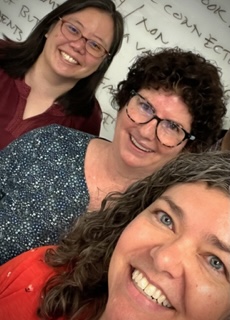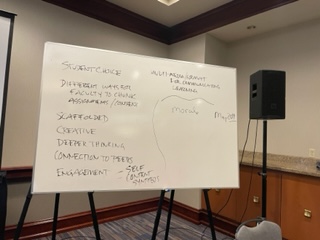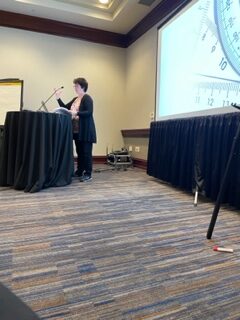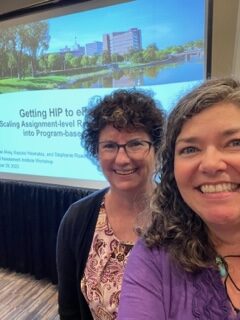
Daba Coura Mbow
A group of educators from different departments at U-M Flint has joined forces to enrich undergraduate education. As part of a joint research effort known as the PMUE (Persistence and Mattering in Undergraduate Education), Kazuko Hiramatsu, Stephanie Roach, Jennifer Alvey and others have been working on teaching methods that help students think about what they’re learning and why it matters. These methods have caught the attention of other scholars and PMUE members were invited to present at a recent meeting of the Assessment Institute, on October 29, 2023, in Indianapolis, Indiana. The key approach integrates this ‘signature assignment’ approach integrates reflection into the regular curriculum.

As part of a recent session at the Assessment Institute meeting, they showcased their experience with Signature Assignments and reflective pedagogies, discussing their integration into the curriculum, particularly in the humanistic inquiry certificate. Much of the agenda was devoted to High Impact Practices (HIP), as defined by the American Association of Colleges and Universities. This particular session focused on HIP implementation in various regions across the nation, specifically exploring approaches in Michigan schools. The workshop emphasized building capacity through Signature Assignments, using reflection to deepen learning, and then scaling this approach into the E-portfolio, an officially recognized high-impact practice, anchoring their new certificate program. For Hiramatsu, Roach, and Alvey, it was a chance to showcase their local initiatives while also encouraging participants to reflect on their own high-impact practices. The presentation discussed the assessment approaches that help document access, satisfaction, and impact, illustrating how this data aids in engaging faculty and students in these projects. The UM-Flint team challenged other attendees to imagine how reflective pedagogy workshops could be applied in their contexts.

The workshop served as a culmination of years of research and curriculum development. One key takeaway for them was identifying the next steps for disseminating their work. The Assessment Institute hosts a peer-reviewed journal called Assessment Update, and the positive feedback Hiramatsu, Alvey, and Roach received there has motivated them to plan potential publications for venues like Assessment Update and others. During the Q&A segment of the workshop, the discussions prompted them to consider emphasizing the importance of their work in the context of career-oriented education and preparation for the future. They’ve always believed that inviting students to reflect is beneficial and empowering for all. Highlighting how this reflection might level the playing field is something they’re keen on exploring further. The engagement and responses from the audience, their questions, and discussions afterward, were encouraging and offered the UM-Flint team fresh perspectives and directions to consider. The next phase involves an IRB-exempt study on the portfolio experience, and they believe the audience for the work, based on the feedback at the meeting, will be significant once the data is gathered and analyzed.

Overall, their goal is to help students feel more confident in their learning and make learning something that matters to them. Next, they are turning to developing more E-portfolios with students, which will take time to develop and share. The team is excited to see how their teaching methods can make a real difference in students’ lives. The work builds on grant-funded work supported by the Teagle Foundation focused on developing a certificate in humanistic inquiry.